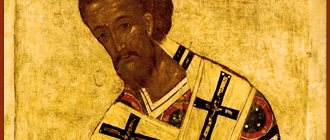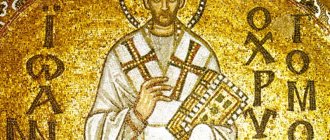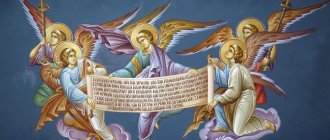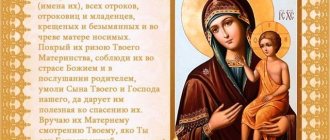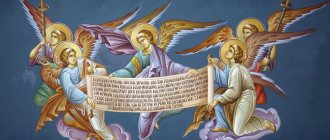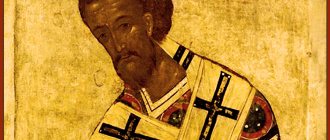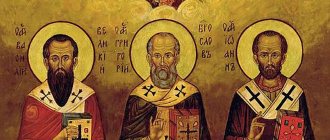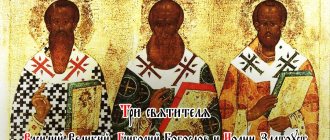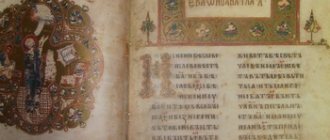About the descent of the Holy Spirit on the Apostles
So, let’s consider why the Lord did not immediately after His Ascension give us the Holy Spirit, but allowed the disciples to first spend several days alone with themselves, and only then sent down the grace of the Spirit. God knows that the human race does not value enough the goods that are in its hands and does not honor what is great unless something to the contrary happens. Let us give an example: a person who is healthy in body cannot know exactly how many benefits health has brought him unless he experiences illness when infirmity befalls him. Therefore, when the disciples in the presence of Christ were in great prosperity, He allowed them to lose the power of the One who assisted for a short time, so that they could feel the importance of the previous blessings. The Holy Spirit set aside a country for each of the apostles to preach the Gospel and descends in the form of tongues, recalling an ancient event, when in ancient times people, having fallen into madness, decided to build a tower that would reach to heaven, and God, through the division of tongues, destroyed their evil agreement, and now the Holy Spirit brings about the union in Christ.
>Let us celebrate the descent of the Comforter in accordance with the dignity of the blessings given to us, not by laying wreaths on the doors, but by decorating our souls so that we can accept grace and receive the fruits that come from Him. What are the fruits of the Spirit? Let us listen to Paul, who says: “The fruit of the spiritual is love, joy, peace” (Gal. V, 22). Let's pay attention to the sequence of his words: first he put love. And this is no coincidence, because love is the source of all good things. And the Lord of all, as a reliable sign of the distinction of His disciples, offered nothing other than love, saying: “By this all understand, as My disciples are, if you have love among yourself” (John XIII, 35). Where there is love, spiritual shortcomings cease to manifest themselves, no harm is done to one’s neighbor, and the flow of all evils is destroyed.
To endure reproaches and dishonor with meekness
Let us learn compliance and meekness from the Savior: “Learn from Me,” He says, “for I am meek and lowly in heart” (Matthew 11:29). If anyone rebels against us, we will be humble. Should anyone act impudently towards us, we will be obliging. If someone sarcastic and torment us with ridicule and curses, we will not respond in kind, so as not to destroy ourselves by taking revenge on ourselves. A man is earth and ashes, and instead of working to save his soul, he finds nothing better than to deal with hurting his brother. If the person scolding us told the truth, then we need to thank him for his reproof, and if it is a lie, then we should not pay attention. So, when someone begins to reproach us, let us think about the punishment to which he is subject, and not only will we not be angry, but we will also shed tears. “For whoever tells his brother that he is a freak is guilty of fiery hell” (Matthew 5:22). If we begin to respond with reproach and become upset, then through this we will make them think that what is said about us is true. Why does a rich man laugh when he hears that he is called a beggar? So we will respond to swear words with a smile.
About the dangers of envy
Love does not harm one's neighbor. Where love reigns, there is no Cain killing his brother. Destroy the source of envy, and you will destroy the flow of all evil. Those who envy cause themselves great harm, and those who are envied, envy serves, if they want, even as a reason for receiving crowns. Let's see how righteous Abel is glorified every day, the reason for the murder became a reason for glorification for him, and sin prepared for his envious and murderer a life more miserable than dead. Let us protect ourselves from envy, because even if we have done many good deeds, we will lose everything if we are burdened with this terrible infection.
About the oath
Swearing is a sin. We should improve in more difficult commandments, such as, for example, to renounce the love of money, to give up our souls for preaching, to laugh at everything earthly, and others like that. If someone offends, show him a favor; if he deceives, pay him with a blessing; if someone begins to blaspheme, show respect. One Old Testament sage said, “Do not accustom your mouth to swearing, and do not make it a habit to use the name of the Holy One in an oath” (Sir. 23:8-9). That is, saying an oath turns into a habit.
Those who utter an oath often take the name of God in vain, which is a grave sin. It is necessary to call on the Lord to save your soul and the souls of loved ones, in prayer for your enemies who offend us, and in other humane and soul-saving petitions. Let us think about why there were so many miracles in apostolic times, but in our time there are none, although God is the same and has the same name? This is because it is not used in the same way by us. They called Him only for Godly requests, but we call for the opposite. If they don’t believe us and because of this we swear, then it is better to use the word: believe.
Getting rid of this bad habit is quite easy; you can ask your loved ones to follow our words. There is no shame in being corrected by others; on the contrary, it is a shame to remove from ourselves those who correct us, and to do this to the detriment of our own salvation. It will be hard in the first three days, but then it will get easier.
Second Discourse on Holy Pentecost
The Lord did not abandon His care for us even after His Ascension and sent us the Comforter of the Holy Spirit, through Whom He sends down to us countless blessings from heaven. Through Him we are freed from slavery, brought into adoption, and lay aside the heavy burden of sins. By His gift, we, flowing to grace, became angels from people, without changing in nature. The Holy Spirit is consubstantial with the Father and the Son, and as the Apostle Paul says, He has the same power as the Father. Those people who do not honor and, moreover, blaspheme the Third Person of the Most Holy Trinity, will not be forgiven of this sin forever. We see how wonderful and mysterious the actions of the Holy Spirit are in the epistles of the Apostle, who said: “Eye has not seen, nor ear has heard, nor has the heart of man breathed what God has prepared for those who love Him” (1 Cor. II: 9).
